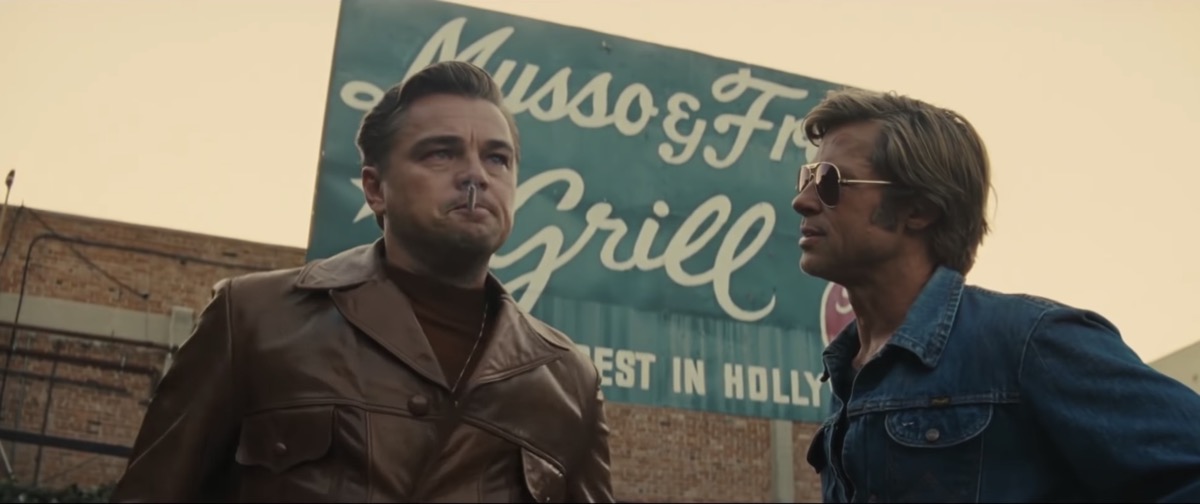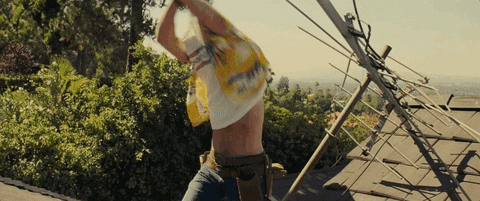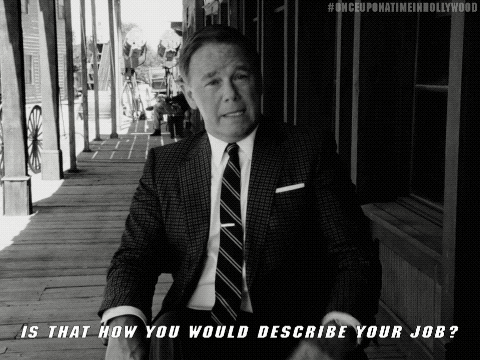Every Quentin Tarantino movie has some “non-PC” or even outright insulting elements, and Once Upon a Time in Hollywood is not exempt, but let’s not overlook the win of the romantic relationship between Cliff Booth (Brad Pitt) and Rick Dalton (Leonardo DiCaprio). Yes, I have heard that they are just close friends—that they are like brothers. I don’t buy it. Would it have been better if they had acknowledged their relationship to the audience?
… Did they not? I know that Tarantino is known for doing nothing halfway—everything is full-blown—but by any other writing standards, our main protagonists ARE in love. It may be unrequited. It may be unconsummated. It may be platonic. It may be brotherly.
But PROBABLY not.
Let’s first look at the evidence of their devotion to one another: Cliff does all the work of a devoted partner. First, he emotionally supports Rick when he believes that his career has ended, asking, “What’s the matter, partner?” (“Partner!” See? I know that this film is set during a time when that term did not commonly mean “significant other,” but the audience is aware of it now, and that kernel of truth is there for us, if we want to interpret it that way.)
After Marvin Shwarz (Al Pacino) encourages Rick to do Italian westerns, Rick replies, “It’s official, old buddy, I’m a has-been.” Cliff provides the 1970s Hollywood equivalent of LeFou’s pep talk to Gaston: not only does six months in Rome sound awesome, but also, “You’re Rick fuckin’ Dalton. Don’t you forget it.” This speech is the kindest way to lift up someone who clearly thrives on the external validation of others, but Cliff KNOWS that’s the case because he knows Rick so well. Granted, that could be just the thing that great friends do for one another.
It could be. Sure.
Cliff even refers to himself as Rick’s “gopher,” a role he’s glad to play. He physically transports his best friend (ahem, PARTNER) when Rick can’t drive himself. Cliff does not allow Rick to feel that disability, and instead, he drives him around. He doesn’t even mention it onscreen. Cliff takes him where he needs to be, hangs out when Rick wants to hang out, and leaves when he wants to be alone—which is, by the way, the best way to support an artist. Cliff knows this and acts on it, despite how frustrating that reality is. And let’s not forget the handyman aspect of Cliff.
We know that Cliff is Rick’s stuntman, but we get to see those skills in action when he gets himself onto the roof—this setting is pre-parkour but WASN’T THAT COOL?—and then, when he takes off his shirt to do the work itself, well, the whole theater leans in a little bit. It’s not just because he was covered in scars from stunt work, but because he’s just … I mean, he’s Brad Pitt, shirtless, doing work on the roof, okay? And the jeans fit just like Bruce Springsteen’s on that one album cover. You know the one, with the red ball cap sticking out of the butt pocket.
At this point, my goal is that, even if you don’t agree with me, you can kind of see how I got to this conclusion, or maybe you’re thinking Cliff might be into Rick, but Rick is Burt Reynolds. Rick is straight, even if Cliff is not. Okay.
But Rick reciprocates Cliff’s actions on more than one occasion, too. He gets him work when the producer won’t have him on set because Cliff allegedly murdered his wife—I think he did, by the way. I totally think that he did it, and Rick helps him cover it by helping him find work. I could go more into this theory, but I don’t have much evidence to support it besides that Rick sweet-talks the producer into getting Cliff the job, and he didn’t have to do that. Not many people WOULD do that for someone who was just their good friend.
You might be thinking, “But you just un-proved your point! BOTH of them were married!” To which I say … So? MANY THINGS CAN BE TRUE, dear reader. Just because they were married to women does not negate the idea that they are ALSO in love with one another. May I remind you, also, that Cliff kills his wife? And, to a lesser degree, there’s a twinge of jealousy when, at the end, Cliff shoos Rick away from the ambulance and says for him to go take care of his Francesca, “that fine creature.” (Rick doesn’t even do that. He doesn’t even go see Francesca after the bloodbath. He goes to network at the Polanskis’ house next door in hopes of landing a new film.)
Cliff also refuses the advances of others. I’m referencing “Pussycat” specifically, here, and there is only one instance of this, but the theory holds water if you want it to. Their relationship, to me, has all the trappings of a monogamous, romantic relationship for at least the beginning of the film. It does not necessarily have to be romantic, but it almost definitely is.
Rick even takes Cliff to Rome for six months, as his stunt man, in addition to letting him use his car and house while he’s out of town. All of these things could be professional courtesies. They could be—but probably not, especially considering how devastated Rick seems on the plane back, when he realizes he can’t afford Cliff anymore—which is after he just starred in several movies and got married.
And let’s talk about the stunt man position, while we’re here: At the very beginning of the film, we have the establishing scenes in which Rick Dalton introduces his stunt man to the interviewer and camera. The dialogue is overtly suggestive.
Interviewer: So, Rick, explain to the audience exactly what a stunt double does.
Rick Dalton: Actors are required to do a lot of dangerous stuff. Cliff here is meant to help carry the load.
Interviewer: Is that, uh, how you describe your job, Cliff?
Cliff Booth: What, carrying his load? Yeah, that’s about right.
I remember seeing this scene in the theater and thinking, “Oh, cool. I wasn’t expecting them to be in a romantic relationship.” Not everyone thought that. That’s okay. I don’t think it was meant for everyone to think that. It’s easy to write that line off as a joke. If you want to, you can.
But if you want them to be in love, you can do that, too. You focus more on that meaningful eye contact, the little giggle between them, and the somewhat uncomfortable pause as the interviewer rallies and tries to redirect the conversation.
Similarly, at the ending climactic scene, in which the Manson Family enters Rick’s house, Cliff fights them alone. Granted, he is a stunt man, and it’s obviously not his first fight (as we have seen), but he tells the intruders where Francesca is. He does not tell them where Rick is.
He does, regardless, risk his own life to save his friend’s—which is a pretty heavy load to carry. He also (although indirectly) gives Rick a leg up in his career, since the closing scene introduces Rick to Sharon Tate, a rising star married to an already-well-established filmmaker. Lastly, when he does shoo Rick away from the ambulance, Rick pauses for a moment and says, “Cliff, you’re a good friend.”
Could that mean just what it says? That Cliff is a good friend, and Rick appreciates it? Sure. It could, but more likely, this is how a man without the language of love between men would tell another man “I love you.”
Failing to more blatantly acknowledge their romantic relationship in an unambiguous way may be old-fashioned. This moderate inclusion is definitely off-trend for Tarantino, who does everything full speed, but he may have decided that being more overt could distract from a more important aspect of the film, which seems to me to be that their friendship (relationship!) saves the life of Sharon Tate and somewhat prevents one of the scariest crimes in history.
Tarantino movies are unapologetic satires, historical rewrites, and noirs, and it makes sense to me that he’d put a little nugget of progress in the film for those who want to find it.
(images: Sony Pictures Releasing)
Mary Kay is a belly-dancer, horror enthusiast, sideshow lover, prose writer, Christian, and literature professor from south of Atlanta. She is currently writing a nonfiction novel about Queen of Policy gangster, Madame Stephanie St. Clair, but you can hear her analysis (and jokes) about scary movies on her blog and the podcast she co-founded, Everything Trying to Kill You. She can be reached at [email protected].
Want more stories like this? Become a subscriber and support the site!
—The Mary Sue has a strict comment policy that forbids, but is not limited to, personal insults toward anyone, hate speech, and trolling.—











Published: Aug 5, 2019 10:42 am